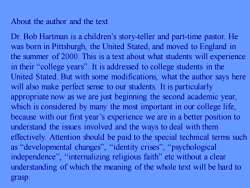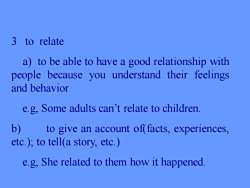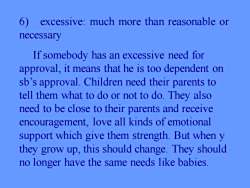《大学基础英语》课程PPT教学课件(三)Lesson 01 your college years

Lesson oneyour college years
your college years Lesson one

About the author and thetextDr. Bob Hartman is a children's story-teller and part-time pastor.Hewas born in Pittsburgh,the United Stated, and moved to England inthe summer of 2000.This is a text about what students will experiencein theircollege years.It is addressed to college students in theUnited Stated.But with some modifications, what the author says herewill also make perfect sense to our students. It is particularlyappropriate now as we are just beginning the second academic year.which is considered by many the most important in our college lifebecause with our first year's experience we are in a better position tounderstand the issues involved and the ways to deal withthemeffectively.Attention should be paid to the special technical terms suchas“developmental changes",“identity crises",“psychologicalindependence",“internalizing religious faith"etc without a clearunderstanding of which the meaning of the whole text will be hard tograsp
About the author and the text Dr. Bob Hartman is a children’s story-teller and part-time pastor. He was born in Pittsburgh, the United Stated, and moved to England in the summer of 2000. This is a text about what students will experience in their “college years”. It is addressed to college students in the United Stated. But with some modifications, what the author says here will also make perfect sense to our students. It is particularly appropriate now as we are just beginning the second academic year, which is considered by many the most important in our college life, because with our first year’s experience we are in a better position to understand the issues involved and the ways to deal with them effectively. Attention should be paid to the special technical terms such as “developmental changes”, “identity crises”, “psychological independence”, “internalizing religious faith” etc without a clear understanding of which the meaning of the whole text will be hard to grasp

WarmUp1, What do you think is particularly important forus English language students?2. Is there generation gap between your parentsand you?3, What are your goals for the college years?
Warm Up 1, What do you think is particularly important for us English language students? 2, Is there generation gap between your parents and you? 3, What are your goals for the college years?

WordStudy1doing through: experiencing, undergoing,sufferingOther uses of this phrasal verbE.g. HE really believed that by saying those magicwords he could go through walls without anytrouble.E.g, I don't think this plan will go through theSecurity Council. (be accepted by)E.g,Wehavegonethrough all these arguments(go over carefully from beginning to end)
Word Study 1 doing through: experiencing, undergoing, suffering Other uses of this phrasal verb: E.g. HE really believed that by saying those magic words he could go through walls without any trouble. E.g, I don’t think this plan will go through the Security Council. (be accepted by) E.g, We have gone through all these arguments. (go over carefully from beginning to end)

2 to perceivea)to think of aseg, He perceived himself a loser who couldnot even support his familyb)to notice: to discover: to observes can perceive very smalleg, Musiciansdifferencesin soundsC)to understand; to graspeg, I gradually perceived that culture andlanguage cannot really be separated
2 to perceive a) to think of as eg, He perceived himself a loser who could not even support his family. b) to notice; to discover; to observe eg, Musicians can perceive very small differences in sounds. c) to understand; to grasp eg, I gradually perceived that culture and language cannot really be separated

3 to relatea) to be able to have a good relationship withpeople because you understand their feelingsand behaviore.g, Some adults can't relate to children.b)to give an account of(facts, experiencesetc.); to tell(a story, etc.)e.g, She related to them how it happened
3 to relate a) to be able to have a good relationship with people because you understand their feelings and behavior e.g, Some adults can’t relate to children. b) to give an account of(facts, experiences, etc.); to tell(a story, etc.) e.g, She related to them how it happened

4 to handlea) to touch, lift or turn with the handseg, This box contains delicate chinaPlease handle with careb)to operate with the handseg, This computer is easy to handleC)to manage, control or cope witheg, Thank you. But I can handle itmyself
4 to handle a) to touch, lift or turn with the hands eg, This box contains delicate china. Please handle with care. b) to operate with the hands eg, This computer is easy to handle. c) to manage, control or cope with eg, Thank you. But I can handle it myself

5) to involve: to include as a necessary part or result: toaffecta)to involve sb. or sthb)toinvolve doing sthc)to involve sb.in sthd)to be involved in stheg,All reforms involvecertainrisks.This project involves digging a canal between the tworivers.We don't want to involve too many people in ourpreparationsHe was deeply involved in the power struggle
5) to involve: to include as a necessary part or result; to affect a) to involve sb. or sth. b) to involve doing sth. c) to involve sb. in sth. d) to be involved in sth eg , All reforms involve certain risks. This project involves digging a canal between the two rivers. We don’t want to involve too many people in our preparations. He was deeply involved in the power struggle

excessive: much more than reasonable ornecessaryIf somebody has an excessive need forapproval, it means that he is too dependent onsb's approval. Children need their parents totell them what to do or not to do. They alsoneed to be close to their parents and receiveencouragement,love all kinds of emotionalsupport which give them strength. But when ythey grow up, this should change. They shouldno longer have the same needs like babies
6) excessive: much more than reasonable or necessary If somebody has an excessive need for approval, it means that he is too dependent on sb’s approval. Children need their parents to tell them what to do or not to do. They also need to be close to their parents and receive encouragement, love all kinds of emotional support which give them strength. But when y they grow up, this should change. They should no longer have the same needs like babies

7)freedom(free)from sth:no longer having sthyou do not want, e.g.The most important freedom our peopleshould have is the freedom from hunger.Note: it is different from freedom of sthCompare,The first is freedom of speech and expression---everywhere in the world. The second isfreedom of every person to worship God in hisown way---everywhere in the world
7) freedom(free) from sth: no longer having sth you do not want, e.g. The most important freedom our people should have is the freedom from hunger. Note: it is different from freedom of sth. Compare; The first is freedom of speech and expression- -everywhere in the world. The second is freedom of every person to worship God in his own way-everywhere in the world
按次数下载不扣除下载券;
注册用户24小时内重复下载只扣除一次;
顺序:VIP每日次数-->可用次数-->下载券;
- 《大学基础英语》课程PPT教学课件(三)Lesson 06 Twelve Angry Men(Part Two).ppt
- 《大学基础英语》课程PPT教学课件(三)Lesson 05 Twelve Angry Men(Part One).ppt
- 《大学基础英语》课程PPT教学课件(三)Lesson 07 The Rivals Martin Armstrong.ppt
- 《大学基础英语》课程PPT教学课件(三)Lesson 08 We’re Only Human Laura Schlessinger.ppt
- 《大学基础英语》课程PPT教学课件(二)Lesson Two Maheegun My Brother.ppt
- 《大学基础英语》课程PPT教学课件(二)Lesson One Another Schol Year- What For?.ppt
- 《大学基础英语》课程PPT教学课件(二)Lesson four The Nightingale and the Rose.ppt
- 《大学基础英语》课程PPT教学课件(二)Lesson Five Say Yes.ppt
- 《大学基础英语》课程PPT教学课件(二)Lesson Seven The Greatest Invention.ppt
- 《大学基础英语》课程PPT教学课件(二)Lesson Ten The Richer, the Poorer.ppt
- 《大学基础英语》课程PPT教学课件(二)Lesson Eleven You Have To Get Me Out Of Here.ppt
- 《大学基础英语》课程PPT教学课件(二)Lesson Nine Quick Fix Society.ppt
- 《大学基础英语》课程PPT教学课件(一)Lesson 2 Going Home.ppt
- 《大学基础英语》课程PPT教学课件(一)Lesson one Half A Day.ppt
- 《大学基础英语》课程PPT教学课件(一)Lesson Three Message of the Land.ppt
- 《大学基础英语》课程PPT教学课件(一)Lesson 8 My Personal Manager.ppt
- 《大学基础英语》课程PPT教学课件(一)Lesson 5 Angels on a Pin.ppt
- 《大学基础英语》课程PPT教学课件(一)Lesson 7 Mandela's Garden.ppt
- 《大学基础英语》课程PPT教学课件(一)Lesson 11 The Midnight Visitor.ppt
- 《大学基础英语》课程教学资源(授课教案)基础英语教案三.doc
- 《大学基础英语》课程PPT教学课件(三)Lesson 02 Discovery of a father.ppt
- 《大学基础英语》课程PPT教学课件(三)Lesson 03 Michael Dell’s Two-Billion-Dollar Dream.ppt
- 《大学基础英语》课程PPT教学课件(三)Lesson 04 Wisdom of Bear Wood Michael Welzenbach.ppt
- 《大学基础英语》课程PPT教学课件(四)Lesson Seven Spring Sowing.ppt
- 《大学基础英语》课程PPT教学课件(四)Lesson Five Man of the Moment.ppt
- 《大学基础英语》课程PPT教学课件(四)Lesson Nine The Most Dangerous Game.ppt
- 《大学基础英语》课程PPT教学课件(四)Lesson Four A Drink in the Passage.ppt
- 《大学基础英语》课程PPT教学课件(四)Lesson three Why Historians Disagree.ppt
- 《大学基础英语》课程PPT教学课件(四)Lesson Two Waiting for the Police.ppt
- 《大学基础英语》课程PPT教学课件(四)Lesson One Thinking as a Hobby.ppt
- 《大学英语》课程教学资源(参考资料)大学英语四级听力应试技巧汇编.doc
- 《大学英语》课程教学资源(参考资料)大学英语四级考试思考.doc
- 《大学英语》课程教学资源(教案讲义)新视野大学英语(1/4).doc
- 《大学英语》课程教学资源(教案讲义)新视野大学英语(2/4).doc
- 《大学英语》课程教学资源(教案讲义)新视野大学英语(3/4).doc
- 《大学英语》课程教学资源(教案讲义)新视野大学英语(4/4).doc
- 《大学英语》课程教学资源(参考资料)四级英语考试英译汉必备知识.ppt
- 《大学英语》课程教学资源(参考资料)大学英语四级写作备课指南.doc
- 《大学英语》课程教学资源(参考资料)英汉翻译——翻译理论与实践.ppt
- 《大学英语》课程参考资料(作文写作)keys to writing.doc
